THEATRE REVIEW
Lara Foot’s captivating adaptation of Othello is an emotional journey highlighting Africa’s colonial past
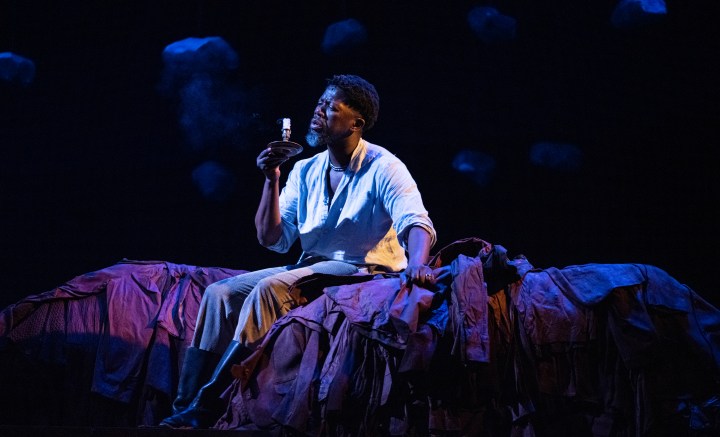
Shakespeare relocated to genocidal German South West Africa brings a fresh humanity to this polished, tears-down-your-cheeks adaptation of Othello.
Othello in many ways has it all. There is, of course, Shakespeare’s blank verse and his meaty insights into the human heart’s many ructions. There’s romance and tragedy, and the horrors of humanity’s ugliest compulsions: war, murder, treachery.
And, of course, jealousy.
The play is suffused with treasures, lines and literary images that have stood the test of time. Whether it’s Shakespeare showing off his knowledge of Elizabethan street lingo that describes sex as “the beast with two backs” or some of the play’s choice descriptors of jealousy (Iago calls it the “green-eyed monster which doth mock [t]he meat it feeds on”), many of its lines are priceless.
It also has racism: racist characters using racist language and viewing the titular Moor through a racist lens. Othello, an army general who has almost, but not quite entirely, been assimilated by his adopted European society, is repeatedly defined by his blackness. To his face and behind his back, he is described in terms of his otherness, a glaring perplexity of the play that has long been debated as a source of his inferiority complex, something connected to his underlying fear that, even if his soul is white, his skin remains black.
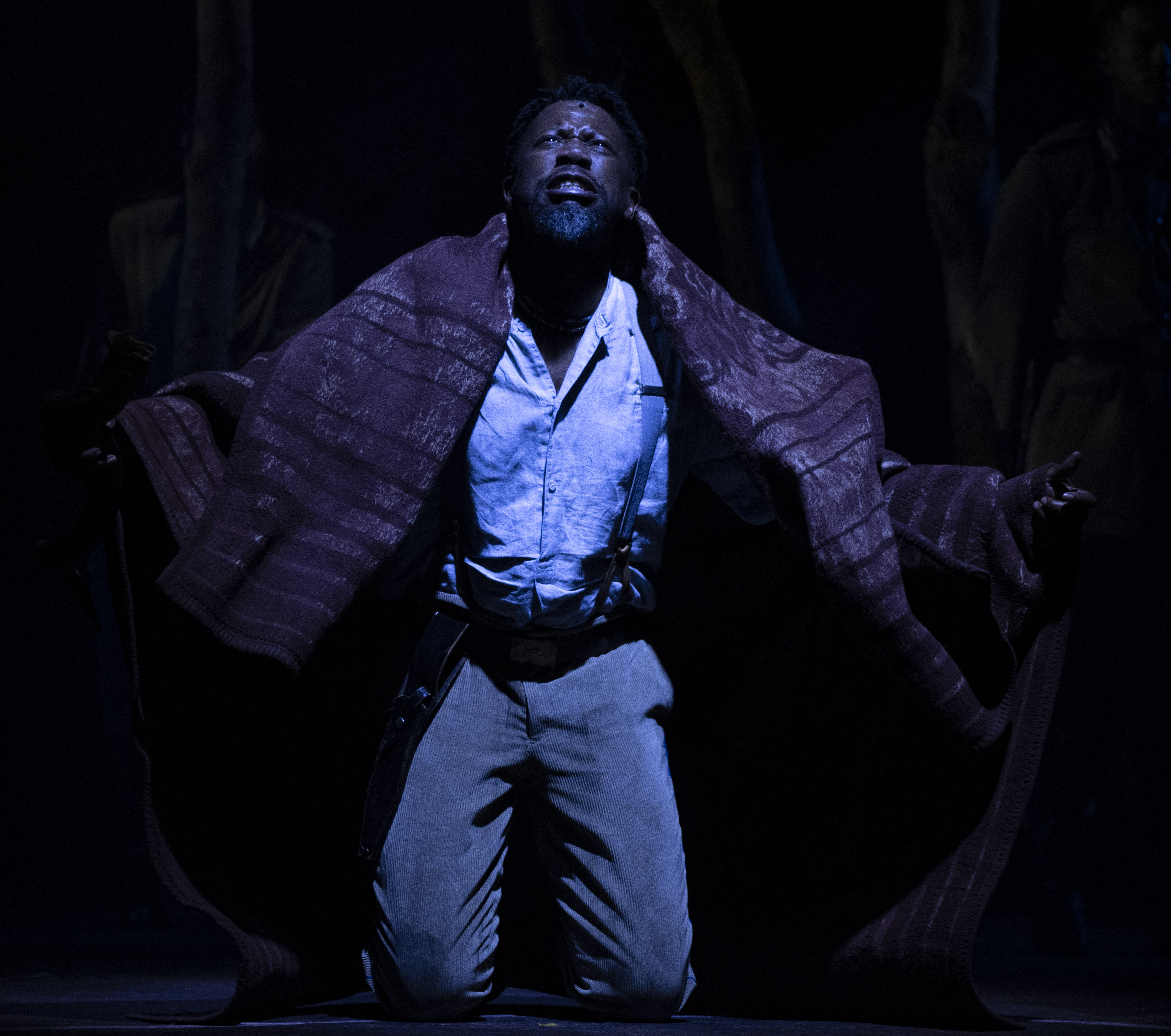
Atandwa Kani in ‘Othello’, showing at The Baxter. (Image: Fiona MacPherson)
Read more in Daily Maverick: Decolonising Shakespeare: setting Othello in Ghana and Pericles in Glasgow
In many ways, a long history of arguments over what Othello has to say about the construction of racial identity makes the text fertile ground from which to investigate problems of race and identity that continue to assail us. In Lara Foot’s substantial and emotionally thrilling adaptation of the classic that’s recently opened at The Baxter in Cape Town, it’s an opportunity for a compelling post-colonial perspective.
Foot has not only transposed the action from Venice and Cyprus to Germany and German-occupied South West Africa, but also infused Shakespeare’s text with translations of the writings of psychoanalyst and political philosopher Frantz Fanon, among the most important postcolonial theorists of the 20th century.
The adaptation opens up space for rigorous reappraisal of the tempestuous insecurities, feelings of inadequacy and underlying lack of self-worth that thwart Othello. And it becomes an engaging context in which to witness Othello confront his own demons and grapple with the complexities of his identity.
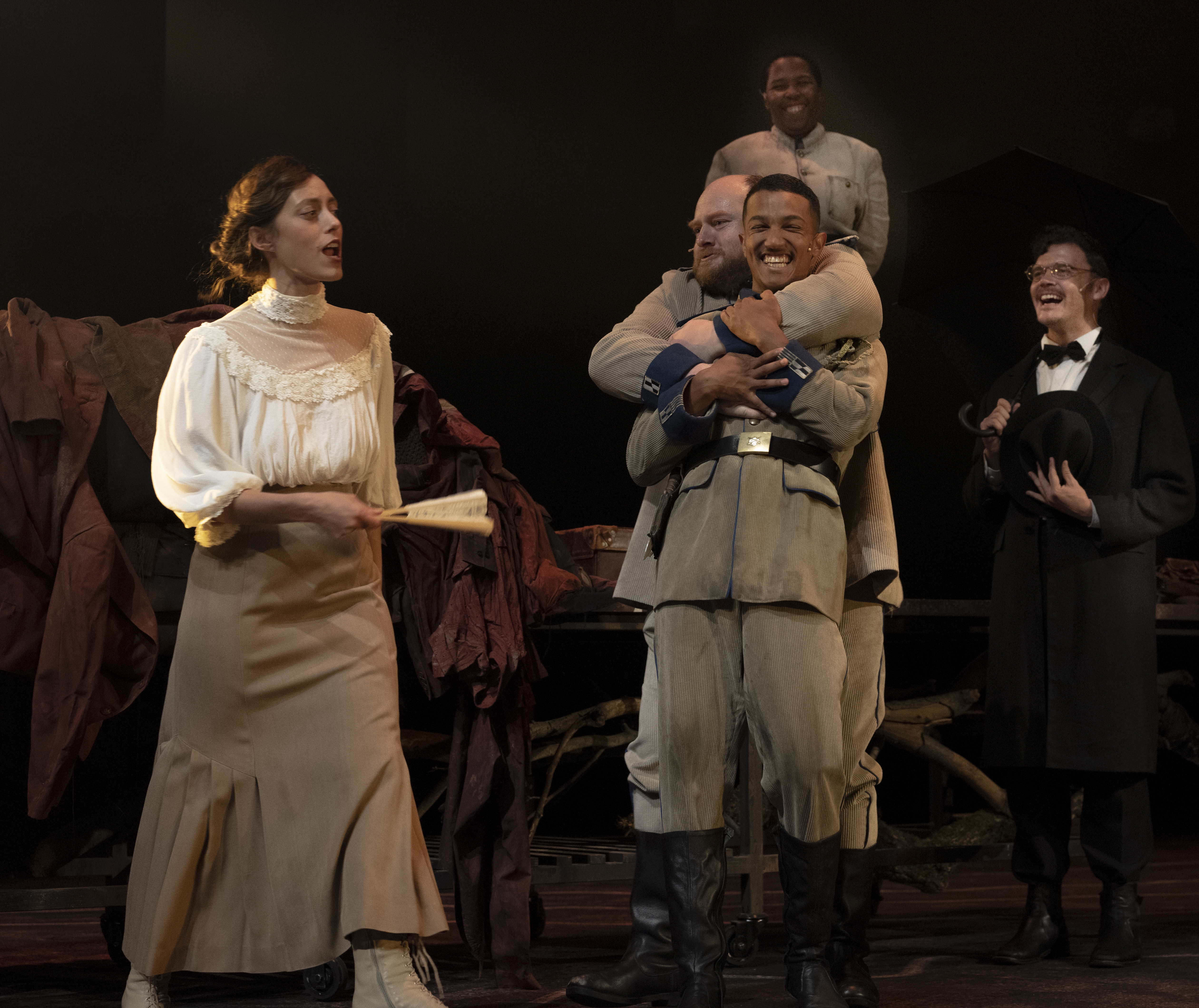
Carla Smith, Lyle October, Albert Pretorius, Wessel Pretorius and Nolufefe Ntshuntshe in ‘Othello’, showing at The Baxter. (Photo: Fiona MacPherson)
Dark shadow of colonialism
This Othello opens with a scene in a German war room in which a large map of Africa takes centre stage and the audience witnesses the continent being discussed like some object for redistribution before the audience witnesses it being literally torn apart. Once in South West Africa, the action sees Othello, the general, overseeing a campaign against that country’s indigenous people, a campaign that, in reality, was a genocide against the Herero and the Nama people.
Foot notes that while Germany has committed sizeable monetary compensation to Namibia, the aid package has been accompanied by a somewhat crouched apology, something she suggests was “seemingly to avoid creating a precedent that could potentially apply to other colonial abuses, much less to the act of colonisation itself”.

‘Othello’, showing at The Baxter. (Photo: Fiona MacPherson)
Foot says her interest is in the effects of colonisation on the people of Namibia, and uses the setting to heighten Othello’s own sense of displacement, his awareness of not truly belonging to the culture of either the German occupiers or the Africa of his birth.
Othello’s consequent vulnerability provides an alternative lens through which to understand his descent into madness.
Foot originally staged the play in Germany where it was produced by the Düsseldorf Schauspielhaus in September 2022, albeit with a different cast. That venture has made available the kind of budget required to really boost the production values of the play. There’s a formidable creative team, and it shows.

Albert Pretorius and Wessel Pretorius in ‘Othello’, showing at The Baxter. (Photo: Fiona MacPherson)
Visual feast
Renowned fine artist Gerhard Marx has designed a visual world that metaphorically conjures the weirdness and eerie emptiness of Namibia’s desert. It’s a strangeness that haunts the production, turns the location into another character.
At times, rows of large stones dangle by wires that form a kind of three-dimensional matrix hinting at the alien physicality of the space in which the German colonisers find themselves. There’s something too of the difficulty of the sandblown conditions, later underscored by a row of dead trees, evoking the ancientness of the land.
Marx’s dreamy designs, beautifully infused with the haunting effects of Kyle Shepherd’s sparse music, become increasingly indicative of the nightmare reality of the devastating genocide that’s happening in the background. In several scenes, huge piles of skins seem to allude to the vast numbers of slain people.
This setting also enables Othello to reconnect with his roots, to communicate with the ancestors, commune with the spirit world. It’s as if there is something about the land itself that connects him to his truth, to an identity unshackled from a European filter.
There is a sense that one is no longer strictly observing Africa through a European lens.
Africa context
Importantly, too, there is Foot’s decision to infiltrate Shakespeare’s text with languages from Africa. isiXhosa and Afrikaans are used, and in places where one hears Othello speak in his mother tongue, his words are translated by other voices, something that adds an ethereal quality, like ghosts conveying Fanon’s writings, as if from some otherworldly dimension.
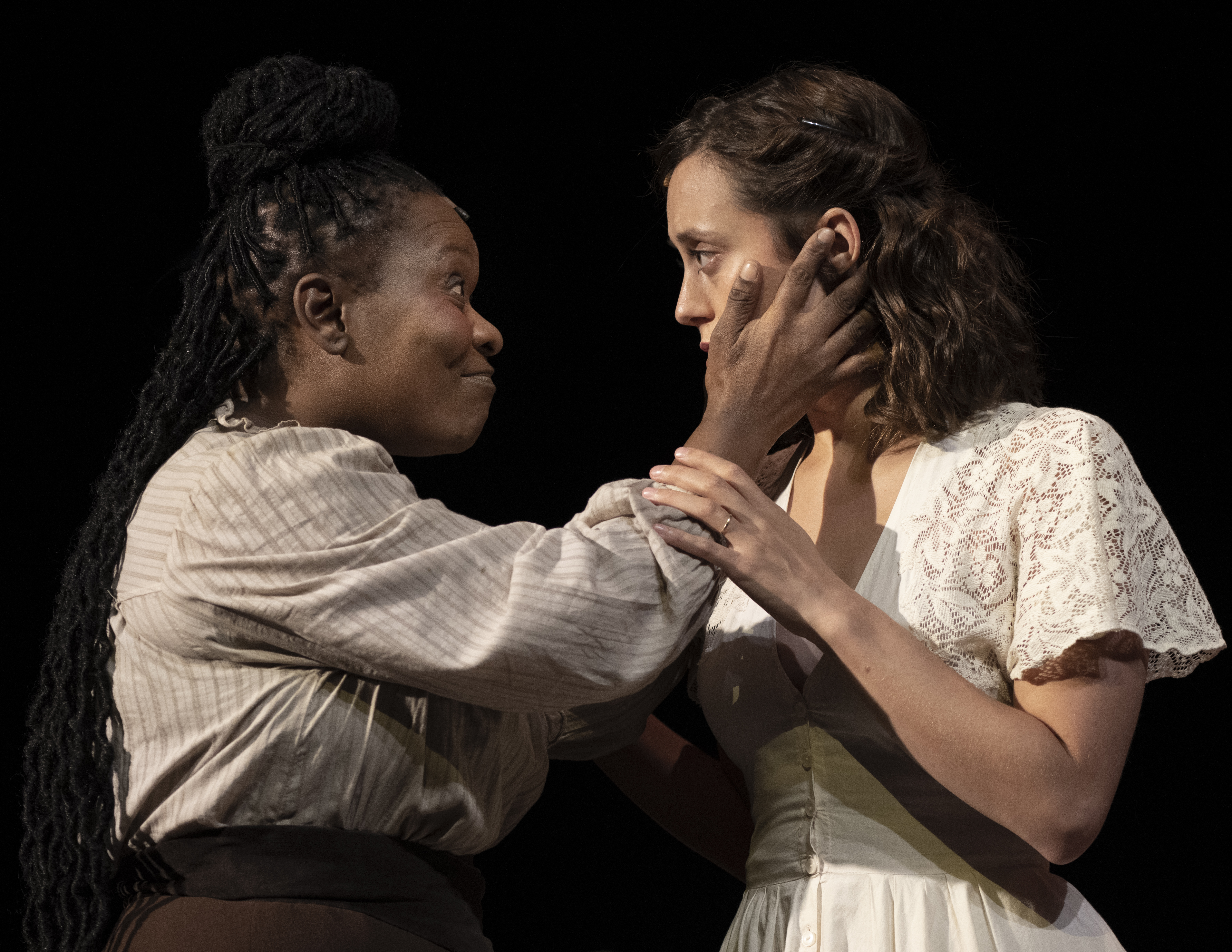
Faniswa Yisa and Carla Smith in ‘Othello’. (Photo: Fiona MacPherson)
As much as this is a production full of ideas, it is also a very human telling.
At the heart of this is Desdemona whose innocence and fervent devotion to Othello is heartbreakingly rendered by an excellent Carla Smith who disappears into the role with absolute conviction.
There’s also Faniswa Yisa as Emilia, who becomes increasingly visible and audible as the play progresses, until finally, she is the one who boldly and bravely speaks out against the insane violence of the men who have wreaked such havoc.
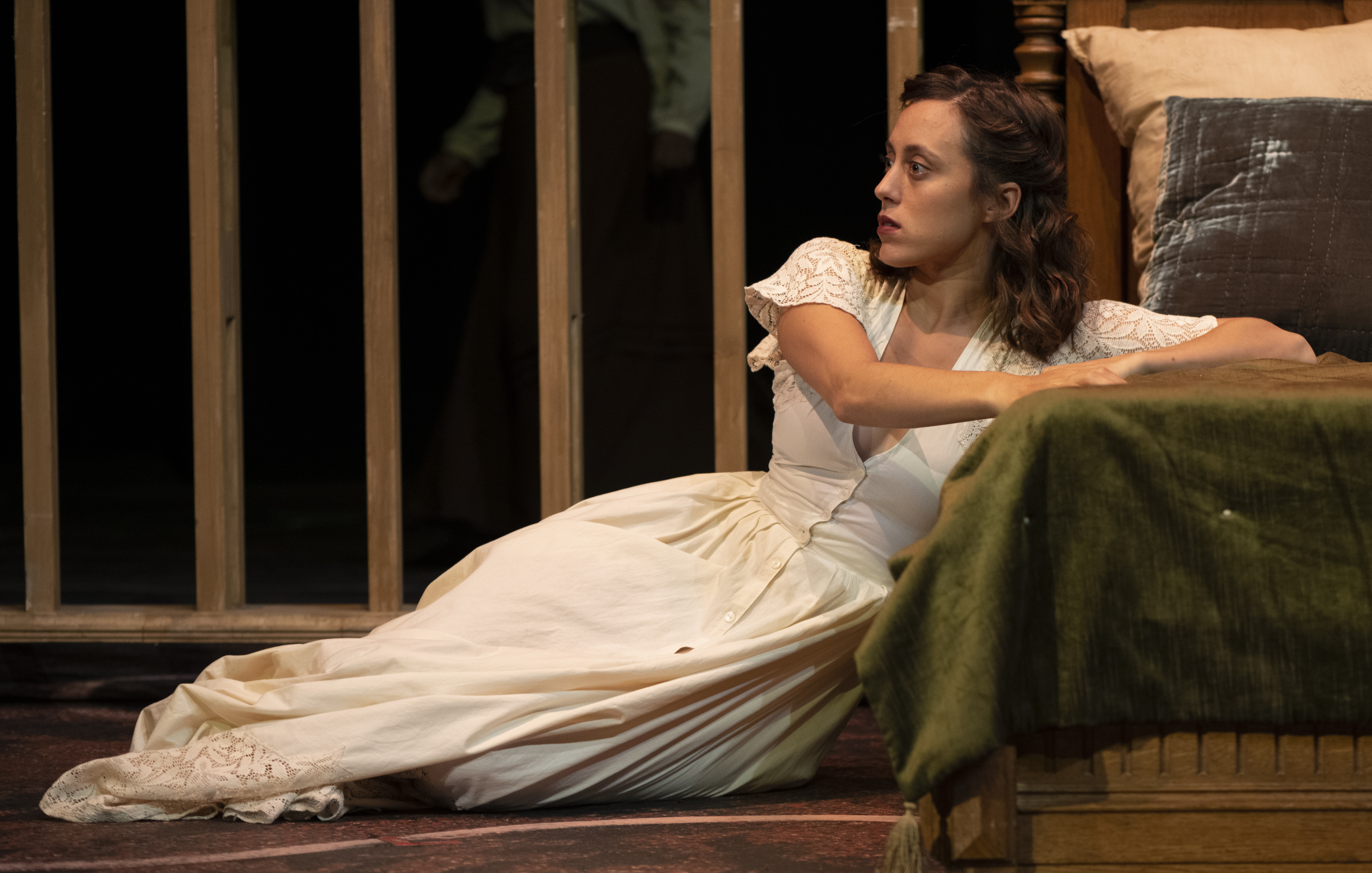
Carla Smith in ‘Othello’. (Photo: Fiona MacPherson)
It is Emilia, ultimately, who expresses the play’s morality, and is killed for daring to do so.
And of course, as Othello, there’s New York-based Atandwa Kani, whose father was in 1987 the first black South African to play the role in Janet Suzman’s history-making Market Theatre production of the play. The younger Kani is an alluring presence on stage and brings a stature and a softness to the role.
He is almost too human, too intellectually level-headed for us to imagine his ultimate fall from grace.
And that’s the trick — the difficulty — of the part, why it’s so sought after by actors who wish to stretch themselves: Othello is exceedingly difficult to pull off, to convince the audience of the deep trauma and complicated psychological truth of a man whose is able to express his love for his wife while simultaneously insisting that she must die.
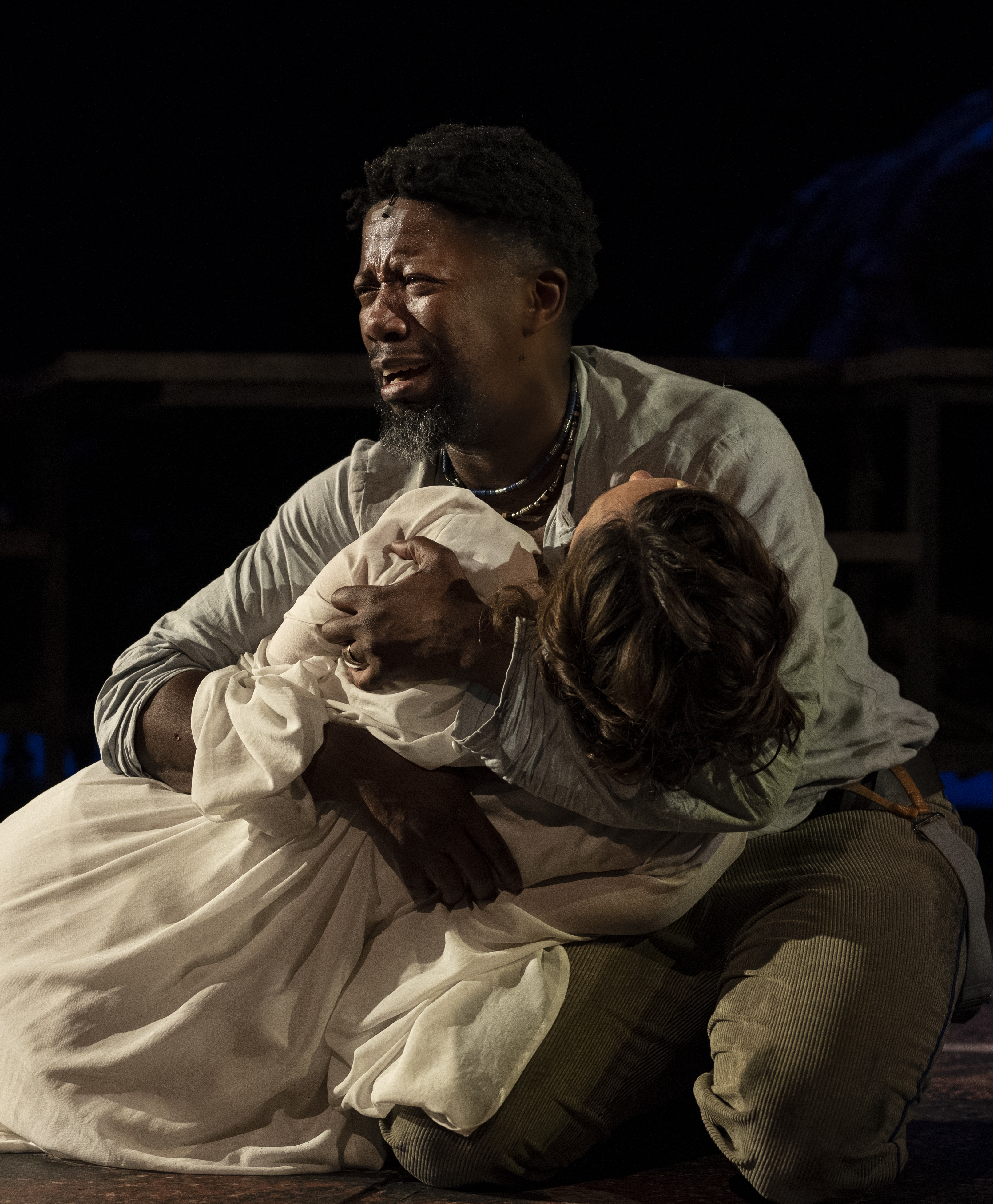
Atandwa Kani as Othello and Carla Smith as Desdemona in ‘Othello’. (Photo: Fiona MacPherson)
Watching him grapple with his demons, seeing him so deeply and earnestly conflicted between his love of Desdemona and the hurt he feels because of her alleged betrayal is quite something to watch.
In his most tortured moments, faced with the knowledge that it is his destiny to undo himself, to condemn his own soul by murdering his wife, those tears in his eyes are very real; you see them and you feel them across the auditorium as you hear the inhalations of breath from the rapt audience, realise that everyone in the room is as captivated and heartbroken as you are.
By contrast, as the evil Iago, Albert Pretorius is a cunning, twisted schemer who despite his cruel hatred is also devilishly funny. Pretorius has him swan about the stage like one of those silent-movie villains on tiptoes. Except, while he metaphorically tiptoes around his enemies, he makes absolutely no effort to conceal his villainy from us. In fact, it is as if he overtly strikes a deal with the audience: glints of his mirthful schemes, smoothed over with fiendish comic timing, in return for our complicitousness.
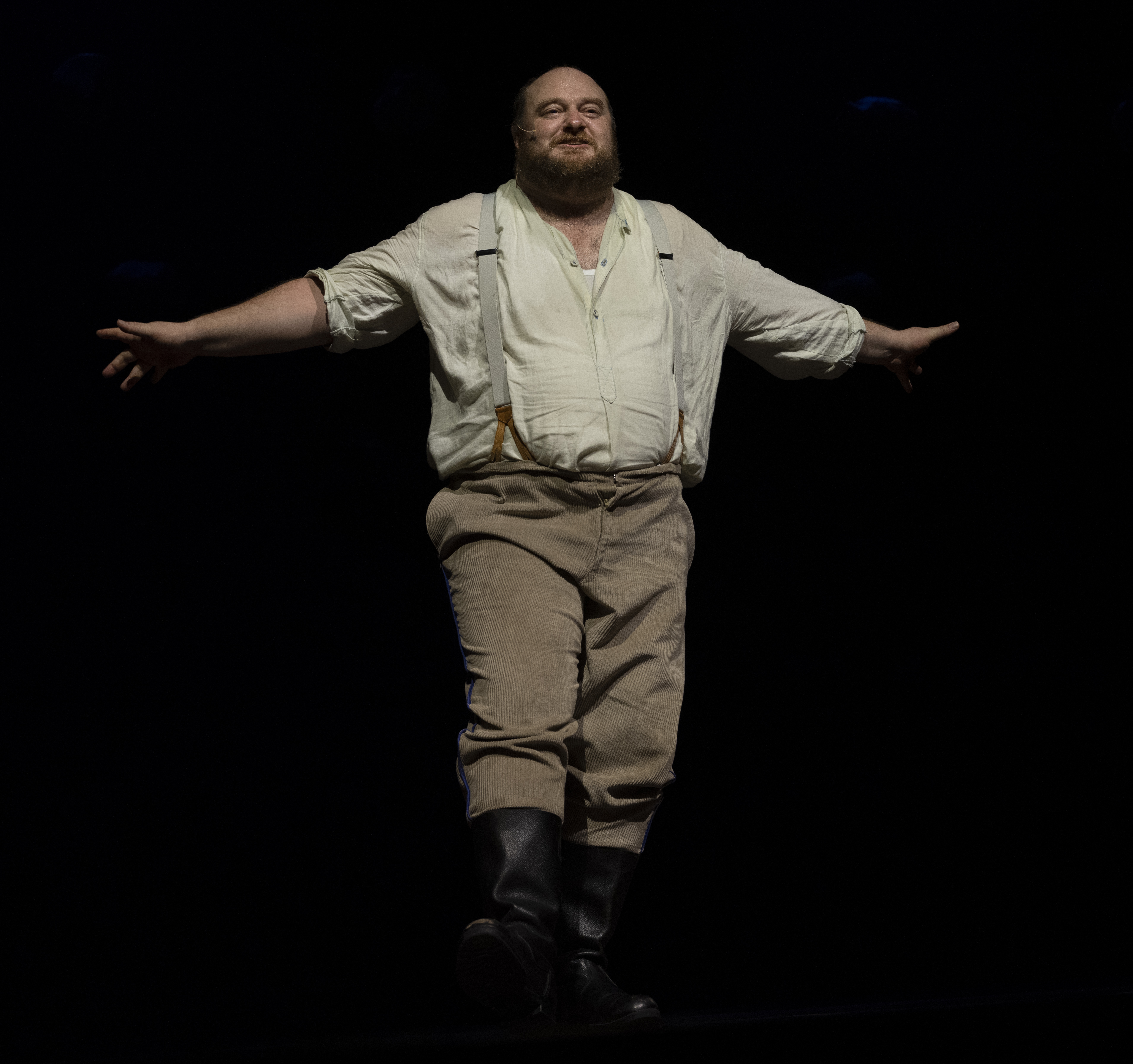
Albert Pretorius in ‘Othello’. (Image: Fiona MacPherson)
Pretorius makes us laugh at Iago’s underhandedness and take delight in the tone of his spite and treachery. He schemes with us, not in spite of us, and ultimately draws us into a compact with the devil.
Isn’t that the trick of the racist? To make themselves seem likeable, even human. One has only to witness the utterances of Trump, the pretences of apartheid, the viciousness of colonisation that many continue to suggest did “more good than harm”.
Such tricks have throughout history been used to hint at the superiority of one group of people over another – Othello reminds us that these are deceptions and reveals to us how easily our beliefs can be twisted.
Foot essentially holds a mirror up to the audience and asks where one stands in relation to both the maliciousness on stage and the events in the real world to which they refer.
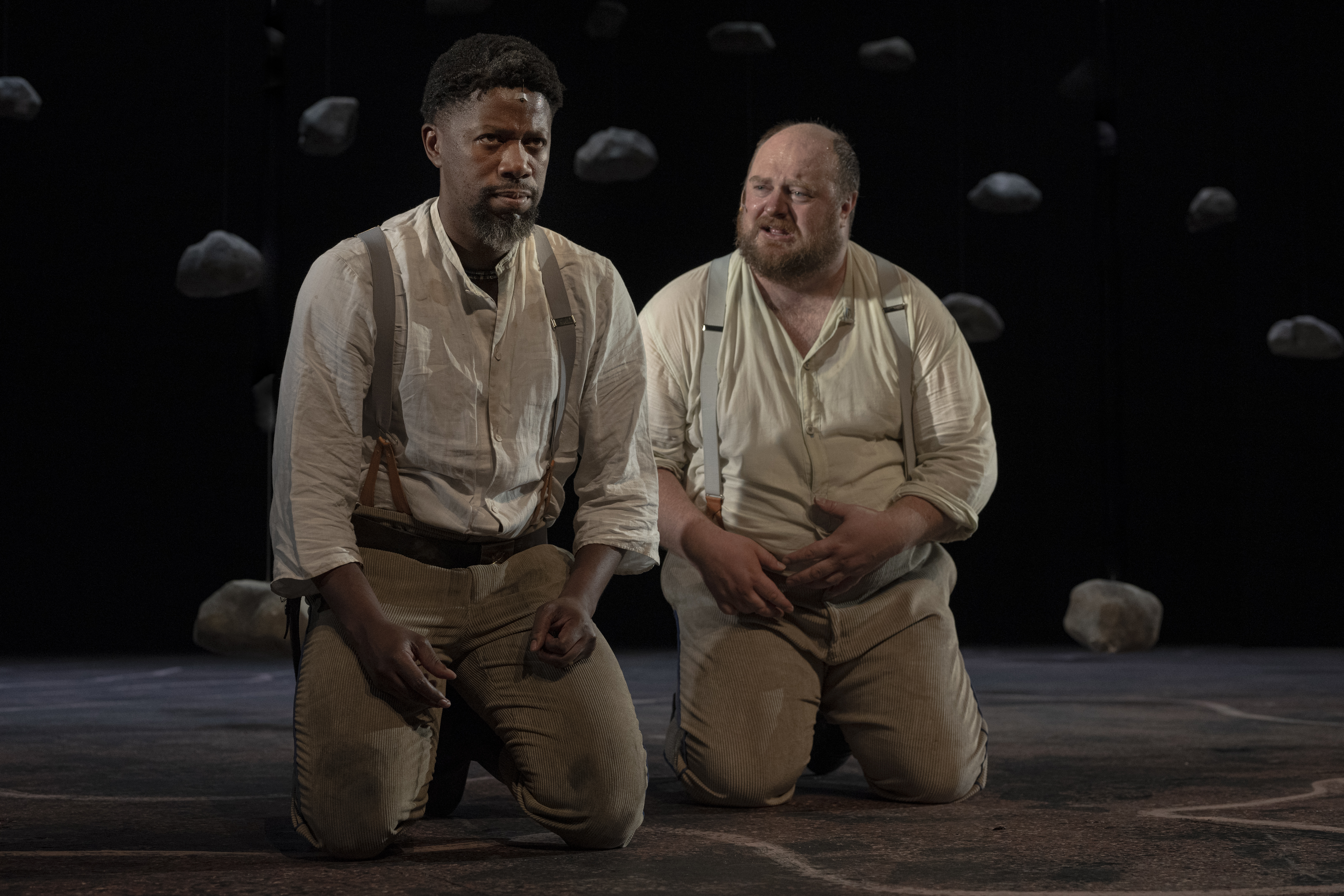
Atandwa Kani and Albert Pretorius in ‘Othello’. (Photo: Fiona MacPherson)
Fanon’s claim was that Europeans unconsciously situate the black man as a symbol of evil and sin. Which is why, in the play, Othello is repeatedly referred to as the devil and even the black devil. When all other aspects of his identity — military general, civil servant, heroic leader and husband — are stripped away, all that remains of him in the eyes of the Europeans who stand in judgment of him, is a devil, a murderer, a beast.
It is throughout the play Iago’s deepest desire to see Othello stripped bare and revealed as some kind of monster incapable of controlling his base desires and animal instincts. By turning Othello into a killer who would murder the thing he loves most in the world, he arguably achieves that.
But Foot’s adaptation — her mustering of Fanon, her relocation of the action onto African soil and infusion of languages from this continent, and her thought-provoking staging of the crucial moment in which Othello kills Desdemona — reframes the question entirely.
It urges the audience to reconsider who the true savage might be. And perhaps also to think about those moments when we, in the audience, conspiratorially laughed at — or, worse, with — Iago.
In those moments, as he looked at us directly in the eye from the front edge of the stage, were we not taken in by him just a bit, charmed by his simple trick of confiding in us and thereby pretending we were on the same side? In those moments, were we not in fact in league with the devil? DM
Othello is playing at The Baxter through 4 May. Tickets are available from WebTickets.



















Thank you Keith. Congratulations Lara…would’ve loved to witness you and your fellow actors/actresses
Coming to Joburg?
This is, in my view, one of the best Shakespeare plays I’ve ever witnessed. It’s simply amazing and if you’ve not booked yet, don’t hesitate for a minute!